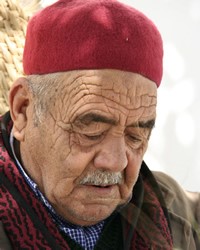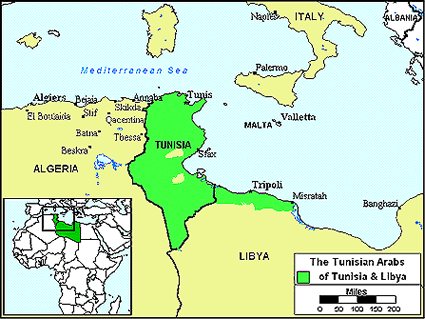In the seventh century, Arab invaders overran the Tunisian Berber tribes, Tunisia's original inhabitants. This eventually led to an almost complete Islamization and Arabization of the people of that country.
They are an Arab-Berber population whose own culture has been greatly influenced by those of Arabs, Berbers, and the French. They have two distinguishing characteristics: a large middle class—a rarity among Arabs—and an extremely youthful population.
The majority of Tunisian Arabs live in their homeland, Tunisia, but some live in other parts of the world like Libya, which is directly east of Tunisia.
In 1956, Tunisia won its independence from France, and by 1959, had successfully begun improving their national education level. However, this success was soon overshadowed by a saturated labor market. As a result, a large number of highly educated Arabs emigrated to Libya and France in search of jobs.
By 2020, thousands of migrant workers from both Tunisia and Libya were regularly streaming across the border for work. When the Covid 19 virus hit the region, officials closed the borders in an effort to contain the virus' spread, forcing a humanitarian crisis on the stranded migrant workers. In April 2020, hundreds forced their way across the border for their journey home.
Virtually all Tunisian Arabs are Sunni Muslim. They adhere to the teachings of the Koran and observe the five "pillars" of Islam, which include: affirming that Allah is the only god and that Mohammed is his prophet; praying; giving alms; fasting; and making a pilgrimage to Mecca.
Many, especially those in rural areas, adhere to pre-Islamic beliefs jinnis—spirits capable of assuming human or animal form and exercising influence over people. The Arab believe that such a spirit can possess a human by entering through the brain and can only be removed in ceremonies performed by a "seer" skilled in "jinn-lore."
There have been very few Tunisians, either in Tunisia or in Libya, who have embraced the only Savior. It is very difficult for people from a Muslim background to give the claims of Christ an honest hearing.
Pray for the Lord to thrust out workers to the Tunisian Arabs in Libya.
Pray for Tunisian Arabs to have enough hunger and thirst for righteousness that they will seek and find the sin-forgiving Savior.
Pray for a Disciple Making Movement among Tunisian Arabs in Libya.
Scripture Prayers for the Arab, Tunisian in Libya.
| Profile Source: Joshua Project |












